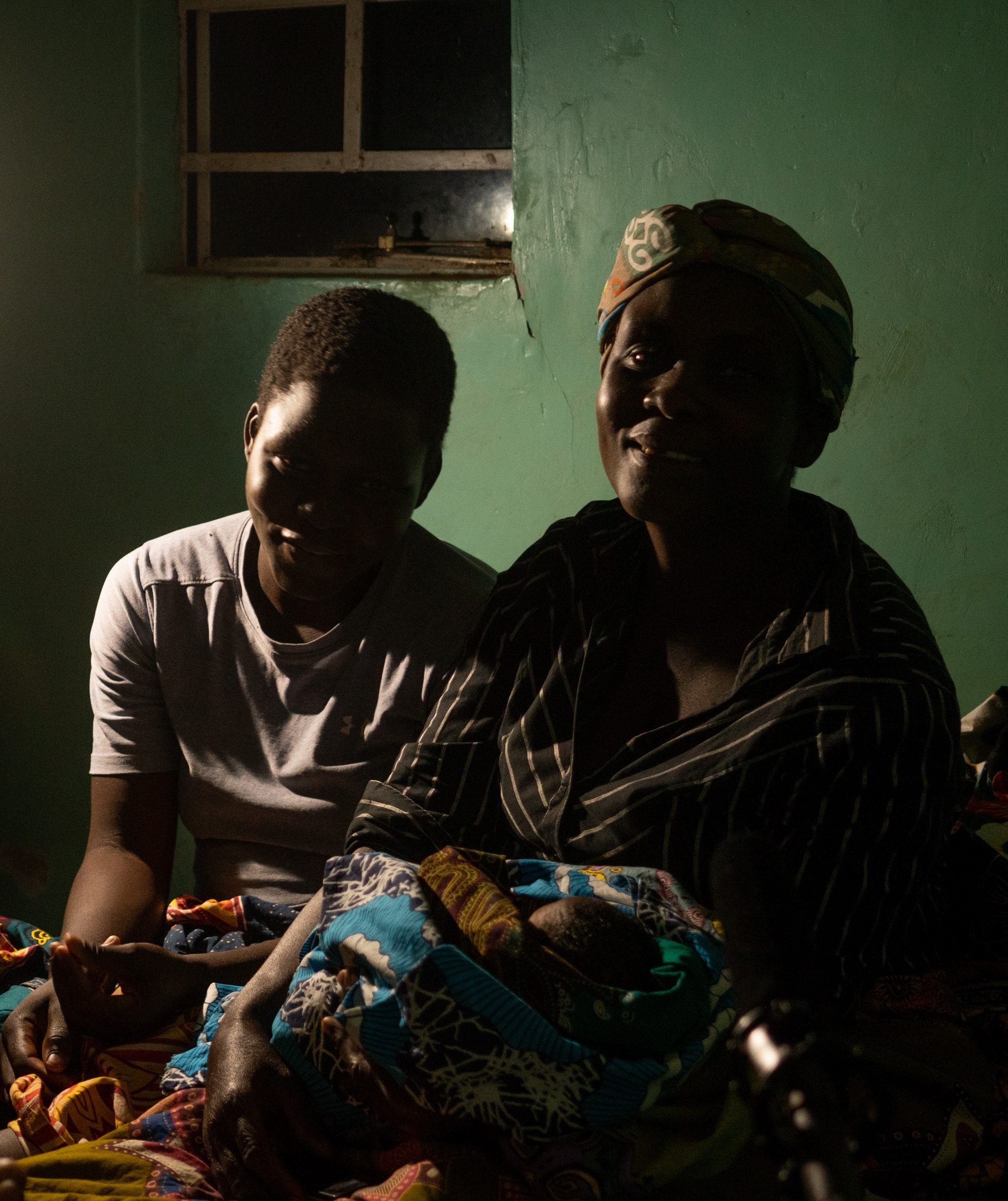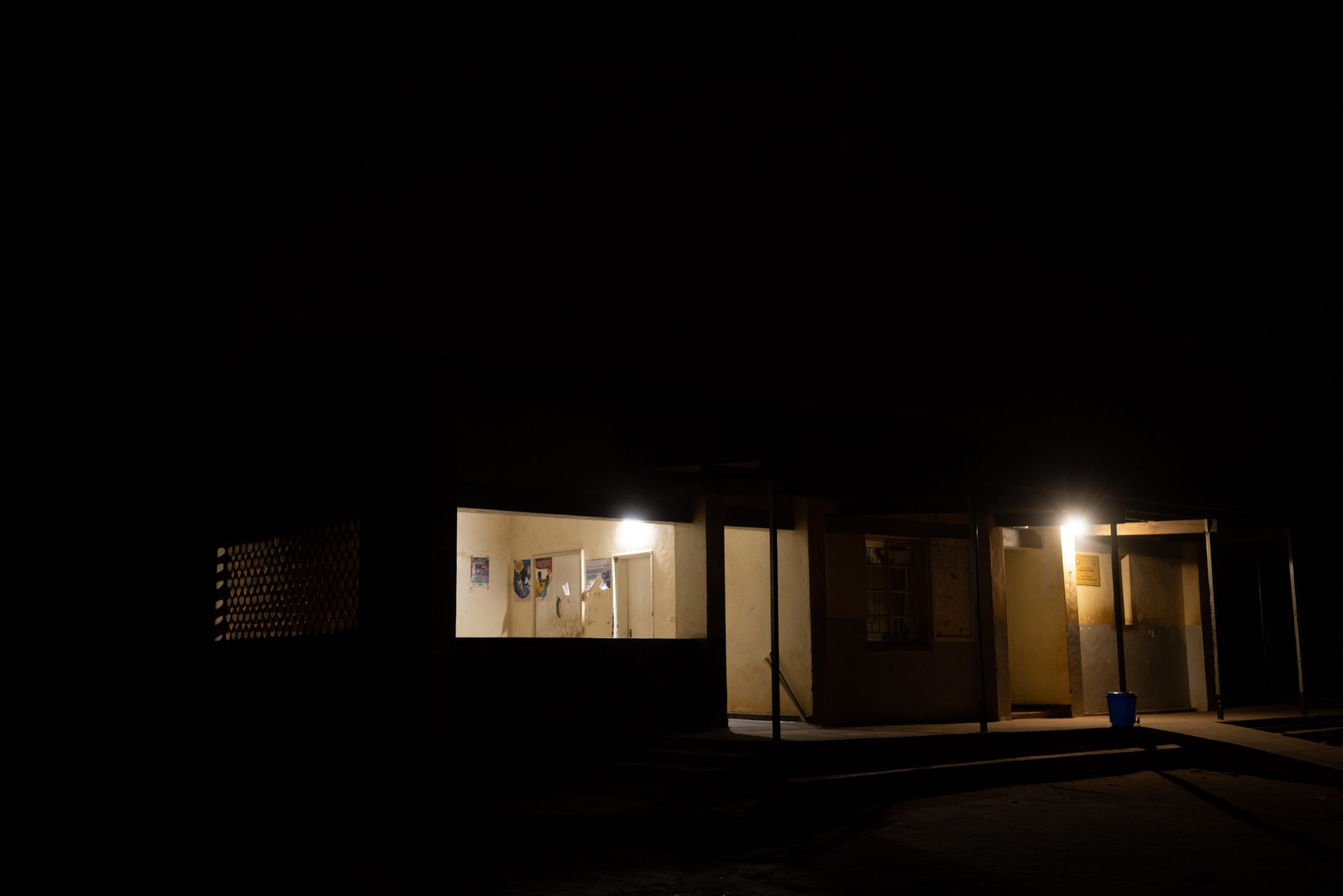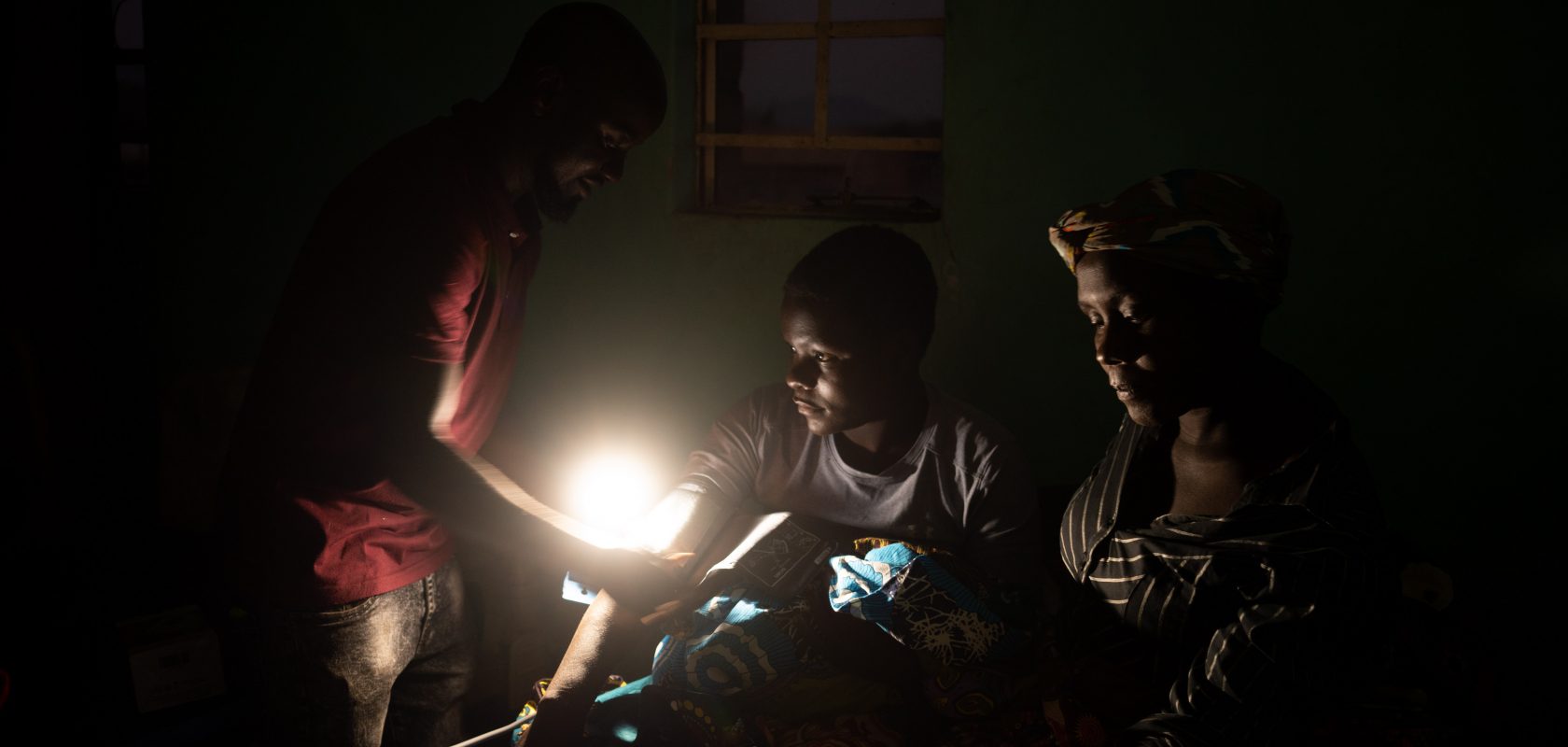About 75% of health clinics in sub- Saharan Africa lack access to reliable electricity. Mtimabii Health Clinic in Mangochi, rural Malawi was one of these. The clinic is open 24 hours and serves an area of 42,000 people, so the days are busy at Mtimabii, and as night falls, it quickly becomes pitch black.
In the darkness, healthcare workers struggle to carry out life-threatening procedures with the dim light that cellphone torches or candles offer. Treating patients safely becomes a near impossible task.
But those dark nights are now a thing of the past at Mtimabii. The SunnyMoney Malawi team recently travelled to Mangochi to install solar power at the clinic as a part of our programme ‘Powering Healthcare’.

Ausman Wayisoni and Martin Phombana installing the fourth set of solar panels on Mtimabii Health Center, Malawi.
Geofrey Makawa, a Medical Assistant at Mtimabii, has been working at the clinic for almost a year. Geofrey enjoys his work as it allows him to interact with the community, but he also emphasises how challenging it’s been.
“Here at Mtimabii we have got a lot of challenges. With a catchment area of 42,000 people we are having a lot of challenges in terms of power, to deliver the quality of service delivery that should be. We don’t have power at maternity, and even sometimes we tell the patients to bring their torch at night so that our nurses can see the patient whom they are attending to.”
To have light at night, the medical practitioners at Mtimabii have been using their own cell phone torches when they are charged, or they have been asking the patients to bring their own torch, if they can afford one. Geofrey explains that most of the people in the area are very poor. People walk long distances to get to the clinic, up to 42km, and many cannot afford a torch. In these instances, they have to use a candle to treat the patients.

Medical Assisstant Geofrey Makawa at Mtimabii Health Center, Mangochi, Malawi.
“It’s keeping them at risk of infection. You cannot extract blood without light. You need to see. And we have a lot of injections there too. You need to prevent yourself from contracting any infection. So it brings a lot of problems in our services,” explains Geofrey.
Seeing how expectant mothers worry about their delivery in the dark made Geofrey think of his own mother and the struggles she has been through. He said, “For me, as a medical practitioner I feel so bad. We came here to help them, and we find that in terms of helping them, we are giving them another problem of sourcing a light. It brings pain. I always think about my home village – which is also so far away. And I think about my mum experiencing this situation. It’s so sad.”
The day before the solar installations took place, Geofrey told us, “Having the light on this facility, I think it will be a joyful thing to the community and the staff. Because we are eager to work 24 hours. But with no light, it’s very difficult and having the light – I think we are going to deliver good services to people. Even the community will be so happy to see the light in the facility.”
And on that night, as our installation team were fast asleep preparing for the early morning installations, Baby Diana was born.

Medical Assistant Geofrey Makawa takes the blood pressure of patient Magrat Patrick. This is moments before the solar system was switched on for the first time at Mtimabii Health Center.
Baby Diana’s mother, Margrat (20), had arrived at the clinic the day before. Margrat’s mother, Ethel, had made sure they brought a torch as she knew there would be no electricity at the clinic. “We have to bring the torch because it helps in the absence of light. Without the torch nurses would have been stranded with the darkness.”
Baby Diana, was the last baby to be born in the dark at Mtimabii.
The new mother, Margrat, believes that the coming of light at the clinic also signifies a brighter future for the baby, “I am happy. The baby was born in the dark but she has come with light,” she said.
Margrat’s mother, Ethel, explained, “Things should be working this way. We will be free. Women here will now have an easier time with motherhood. When the clinic is in a blackout, our hearts are full of worry. But now that we see this light, we have joy in our hearts.”
Baby Diana was born a healthy baby, but mothers aren’t always so lucky. Complications during childbirth due to lack of light are common.

Baby Diana with her mother Magret Patrick and Grandmother Ethel Khuwikia.
Harima Dala, a 45-year-old farmer, has taken on the role of secretary at ‘Mother Group’ in Mtimabii Health Centre, as well as Vice Secretary of the Electricity Management Committee. She knows how important light is.
“I am one of the people who faced problems during child delivery. When labour pains started, it was around 11:00 o’clock at night. We rushed to the Labour Section but it was completely dark. Some people went out to buy paraffin but they found the shop closed. They went on to ask for light from other people. By the time they came back, the baby was already born. I’d delivered in complete darkness.”
Harima’s baby started showing breathing difficulties. As a result, the nurses called for an ambulance to rush her to another hospital. However, she couldn’t manage to get into the ambulance due to the darkness.
The nurses were forced to borrow a glass-covered kerosene lamp from the nearby houses. “The nurses called for an ambulance to rush us to Mangochi district hospital. When the ambulance came, we had to borrow a glass covered lamp from the nearby houses. This is one of the burdens that I went through. I was deeply touched by this,” said Harima.

Harima Dala, Secretary of Mother Group at Mtimabii Health Centre.
Our team left Mtimabii Health Clinic the day after, knowing that patients will now be treated by safe, clean light and expectant mothers will no longer have to bring a candle for the delivery of their baby.
No health clinic should be left in the dark, learn more about our work on Powering Healthcare.

Lights turned on at Mtimabii Health Center.
